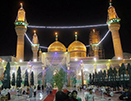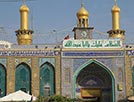Extravagance depends upon the capacity of every person
- Details
- Hits: 2858
Extravagance depends upon the capacity of every person
It is necessary to know that extravagance depend upon the honour and respect of different people, their health and sickness, youth and old age, poverty and affluence, income levels etc. It is possible that an expensive dress may not constitute extravagance for a person who can afford the same and who holds a respectable position in society. Whereas for one who is not having the same position and income, wearing the same dress will constitute extravagance.
Kulayni (r.a.) has recorded a tradition from Imam Ja’far as-Sadiq (a.s.) that he said,
“There are some poor people who squander more than the rich. Because the rich squander from the wealth Allah has given whereas the poor squander what they have not.”
(Furu al-KÄfi)
Thus such poor people are always involved in economic problems and debts. They do not consider their circumstances and spend beyond their means. This is extravagance. It is a result of competing with those who are more affluent. In trying to keep up with them one indulges in extravagance and spends ones life in misery, sorrow and grief. If instead people look at those who are less privileged than them, as ordered by Islam, they would never fall prey to wasteful expenditure. Thus, bankruptcy is often caused by extravagance. If people obey the rules of Islam and act with common sense and reason, they will always practice moderation and keep aloof from this sin; they will be satisfied with whatever they have and live within their means. Consequently, they will enjoy the goodness of this world and the Hereafter.
Amir ul-Mu’minÄ«n ‘Ali (a.s.) says:
“No one can taste true belief till he cultivates Three qualities
1. Love of the knowledge of religious rules and regulations.
2. Patience in calamities and
3. Realistic estimation of his expenses.”
(Safinat’ul-BihÄr)
Imam Ja’far as-Sadiq (a.s.) says:
“When a person practices moderation I guarantee that he will never become destitute.”
(Wasa’il ul-Shia)
Imam Muhammad al-Baqir (a.s.) says:
“Three things facilitate salvation: Fearing Allah, practising moderation in poverty and affluence, to say only the rightful thing even when angry or displeased.”
(Safinat’ul-BihÄr)
Imam Ja’far as-Sadiq (a.s.) explains the ayat
“We will certainly make him live a happy life.”
(Surah an-Nahl 16:97)
and says that,
“‘A happy life’ is contentment.”











